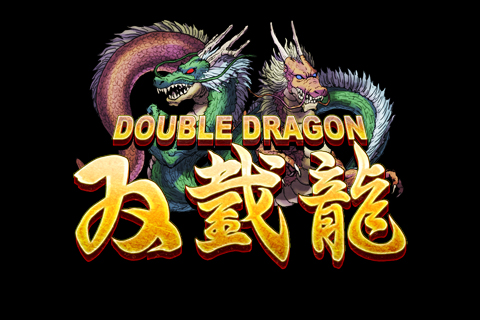

Imagine, the publisher of several computer ports of RENEGADE would then go on to develop their own – fully licensed – yet wholly original sequels TARGET: RENEGADE, and RENEGADE III: THE FINAL CHAPTER. As such, there were a lot of different versions of RENEGADE.
#DOUBLE DRAGON CARTOON LOG LICENSE#
As was standard at the time, different companies would be granted the license to develop and/or publish ports of a game for various platforms and markets. NEKKETSU KOUHA KUNIO-KUN – or more accurately its localised-for-the-west overseas equivalent, RENEGADE, received several ports for various home consoles and computers.

A prestigious spot held until Capcom’s STREET FIGHTER II (itself a followup to their seminal 1989 beat ’em up FINAL FIGHT) ushered in the era of VS fighting games in 1991. 1986’s NEKKETSU KOUHA KUNIO-KUN essentially birthed the “beat ’em up” action game – and with the massive success of its followup DOUBLE DRAGON in 1987, the genre had all but taken over the torch previously held by space shoot ’em ups as the king of arcades. Technos was never the biggest company, nor a household name on the level of SEGA, Namco, Capcom or Konami, but they had a very big impact on video games in the 80’s nonetheless. In an age where the media landscape is dominated by risk-averse bets on known quantities, and rights holders dictate in the finest detail how their brand is to be depicted – lest a low-quality product sully the brand – the Technos “a mere moderate amount of fucks given” approach truly is a breath of fresh air. As of 2015, The Technos brand and associated IP is owned by Arc System Works, who – so far – seem to be doing a commendable job keeping the spirit of Technos alive with quality re-releases and even brand new KUNIO-KUN games, among other things.īut perhaps the most delightful thing about Technos’s newest incarnation is how it seems to maintain one of the things that fascinate me the most about the company: their unusually relaxed handling of their IP.Īlthough less noteworthy back in the 80’s when loads of Japanese video game developers and publishers would license out their games to European microcomputer companies without much oversight, Technos never seemed to ever really tighten up their grip around their properties. Like many game companies from the 80’s, Technos eventually went under, even if some of the same people, brands and games stayed active in one form or another. Although not every Technos and Technos-related game over the years has been of the highest quality, I’ll always have the utmost respect and admiration for the company and their games for their innovation, creativity and sheer personality. The DOUBLE DRAGON and KUNIO-KUN games were absolute favourites of mine in formative years, and almost certainly a big reason why I’m still very much fond of beat ’em ups. For about as long as I can recall, I’ve been a big fan of Technos Japan.


 0 kommentar(er)
0 kommentar(er)
